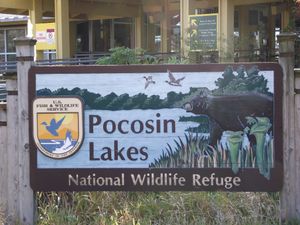
This agreement marks the beginning of a collaboration between three entities - a federal agency, Fish & Wildlife Service, a non-profit, the National Wildlife Refuge Association, and Catawba College. This agreement showcases the commitment of all three organizations to foster the next generation of conservation leaders.
“We are excited to offer our students this unique opportunity to immerse themselves in land management, environmental education, and conservation work within a national wildlife refuge,” said Dr. Andrew Jacobson, Assistant Professor of GIS and Conservation at Catawba. “This partnership exemplifies our commitment to experiential learning and environmental stewardship, empowering students to make a meaningful impact in the field of conservation.”
Throughout the internship, students will engage in various conservation projects, contributing to the Pocosin Lakes’ ongoing wetland restoration efforts and wildlife monitoring programs. Interns will also be involved in educational programs for visitors such as with the critically endangered Red Wolf, found nowhere else in the world. Additional opportunities abound, such as monitoring water levels, conducting bat acoustic surveys, and surveying vegetation in the threatened Atlantic white cedar ecosystem. Interns will also have the opportunity to assist with sea turtle nest monitoring at Pea Island National Wildlife Refuge.
Undergraduates Salem Fleming and Ana Price, both Environment and Sustainability majors, are the inaugural interns, living and working at the refuge for 12 weeks this summer.
Ana Price is excited for this opportunity because it will be her first time living outside of the Piedmont region of North Carolina. She says, “I’ve learned about lots of concepts and tools in my coursework at Catawba, but I’m beyond thrilled to be able to apply and expand my skills in a professional setting. A wildlife refuge biologist is exactly the type of exciting, hands-on job I’d love for a career.”
Salem Fleming agrees, and “can’t wait to get out there and start making a positive impact.”
About Pocosin Lakes National Wildlife Refuge
Pocosin Lakes National Wildlife Refuge conserves a rare type of wetland habitat, known as "pocosin," derived from a Native American word meaning "swamp on a hill." The refuge encompasses vast acres of natural wetlands, including the unique southeastern pocosin peat wetlands, open water on Pungo and New Lakes, upland pine forests, and managed moist-soil and agricultural units that provide high-energy food for waterfowl. More than a hundred thousand ducks, geese, and swans congregate on the refuge in winter, and the refuge supports one of the densest populations of black bear ever reported. The refuge is the site of one of the country’s largest wetland restoration projects, restoring natural hydrology to the pocosin peatlands. Additional information is available at fws.gov.
About The National Wildlife Refuge Association
The National Wildlife Refuge Association protects, promotes, and enhances the National Wildlife Refuge System and the landscapes beyond its boundaries. Additional information is available at refugeassociation.org.
